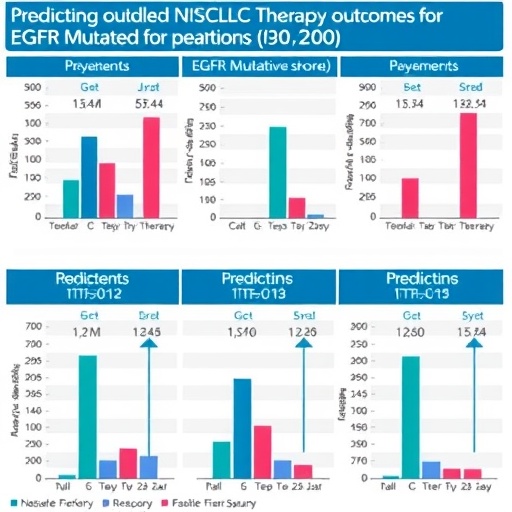In a groundbreaking study that could reshape the therapeutic landscape for patients with advanced EGFR-mutated non-small cell lung cancer (NSCLC), researchers Chai, Li, Yang, and their colleagues have unveiled a multimodal prediction system for evaluating the outcomes of tyrosine kinase inhibitor (TKI) therapies. This soon-to-be-published research in J Transl Med promises to revolutionize the way oncologists approach individualized treatment for one of the most challenging forms of cancer.
The team behind this research has recognized a critical gap in the existing methodologies for predicting patient responses to TKIs. Traditionally, treatment decisions for NSCLC patients have relied heavily on genetic testing and basic clinical parameters; however, these approaches often lack the nuance and precision needed for effective treatment planning. By integrating multiple data modalities, including genomic, clinical, and imaging data, the researchers aim to provide a more holistic understanding of how patients with EGFR mutations will respond to TKI therapies.
An impressive array of data sources was harnessed for this study, including next-generation sequencing results, clinical trial databases, and advanced imaging techniques. By employing advanced machine learning algorithms, the authors were able to reveal patterns and correlations that have previously gone unnoticed within standard analytic frameworks. This cross-disciplinary approach has the potential to enhance not just treatment efficacy but also patient stratification, ensuring that individuals receive the most appropriate and effective therapies tailored uniquely to their tumor characteristics.
The importance of integrating these diverse data types cannot be overstated. In the context of advanced NSCLC, where tumor heterogeneity can greatly influence treatment outcomes, a multimodal approach allows for the nuanced understanding of how various factors interact to affect patient prognosis. This complexity has historically posed significant challenges in personalizing oncological care; however, the current study endeavors to dismantle these barriers and pave the way for more targeted therapeutic interventions.
Among the many findings presented in the study, the researchers discovered that specific genetic alterations within the EGFR gene could be more predictive of TKI therapy responses when analyzed in conjunction with imaging characteristics. This interplay between molecular and phenotypic data offers valuable insights into tumor behavior and can guide oncologists in selecting the most effective therapeutic regimens. Enhanced precision in prediction models not only helps in therapy selection but also in identifying patients who may benefit from alternative treatment modalities sooner.
Furthermore, the researchers employed rigorous validation processes to ensure the robustness and reliability of their predictive model. By utilizing datasets from several institutions around the globe, the authors were able to mitigate the risks of overfitting and bolster the model’s generalizability across diverse patient populations. This aspect of the study serves as a critical reminder of the importance of collaborative research in achieving statistically significant and clinically applicable findings.
The significance of their work extends beyond the immediate benefits to patient care; it also fosters a broader understanding of cancer biology and therapy response mechanisms. By elucidating the links between various data modalities and patient outcomes, the study contributes to the overall body of knowledge regarding precision medicine in oncology. This integrative approach may inspire future research initiatives aimed at identifying similar predictive markers in other cancer types.
As the study anticipates publication, the potentially transformative effects of its findings on clinical practice are already igniting discussions among oncologists and researchers alike. With the ever-evolving landscape of cancer treatments and the critical need for personalized approaches, the incorporation of robust predictive modeling could catalyze new standards of care in the near future.
What sets this research apart is not merely its innovative approach but also its timeliness. With the increasing approvals of novel TKI agents, understanding which patients will benefit most from these therapies is of utmost importance. As clinical trial landscapes become more crowded, effective patient selection strategies will be needed to navigate the complexities of modern cancer therapies successfully.
Patient empowerment is another crucial element addressed within the study. By producing predictive models that clinicians can rely upon, patients stand to benefit from informed discussions regarding their treatment options. Medical dialogues that prioritize patient involvement have the potential to enhance patient adherence and overall satisfaction with care.
While the study offers tremendous promise, it also raises important questions regarding future directions in cancer treatment research. How can similar methodologies be applied to other cancer types? Can the framework established by Chai and colleagues be adapted for a broader array of therapeutics beyond TKIs? These inquiries highlight the study’s role as a launching pad for continued exploration in the field.
In conclusion, the multidisciplinary research conducted by Chai, Li, Yang, and their team marks a significant milestone in the quest for personalized oncology. By integrating multifaceted data sources to predict TKI outcomes in advanced EGFR-mutated NSCLC patients, this work stands to change the standard of care for many individuals suffering from this debilitating disease. As the medical community eagerly awaits the full publication and implications of these findings, it is clear that the future of lung cancer treatment may be brighter than ever before.
Subject of Research: Multimodal prediction of tyrosine kinase inhibitors therapy outcomes in advanced EGFR-mutated NSCLC patients
Article Title: Multimodal prediction of tyrosine kinase inhibitors therapy outcomes in advanced EGFR-mutated NSCLC patients
Article References: Chai, X., Li, H., Yang, M. et al. Multimodal prediction of tyrosine kinase inhibitors therapy outcomes in advanced EGFR-mutated NSCLC patients. J Transl Med 23, 933 (2025). https://doi.org/10.1186/s12967-025-06956-8
Image Credits: AI Generated
DOI: 10.1186/s12967-025-06956-8
Keywords: Tyrosine Kinase Inhibitors, EGFR-mutated NSCLC, Multimodal Prediction, Personalized Medicine, Advanced Cancer Therapies, Machine Learning.




